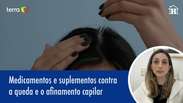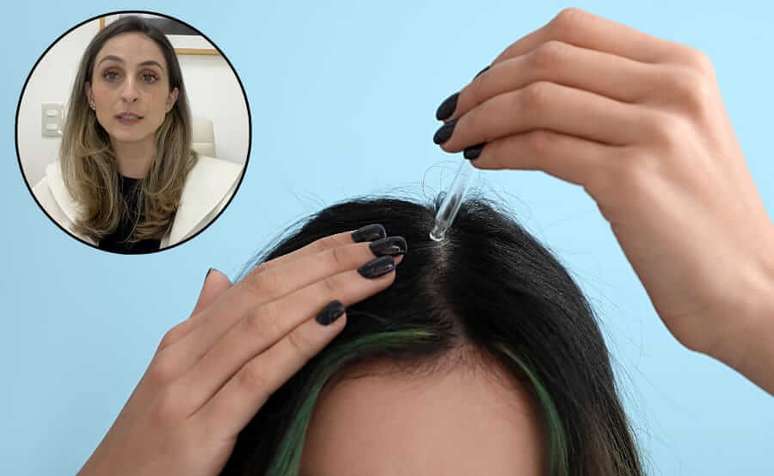Baldness should be treated with topical and oral medications, and supplements may also be indicated depending on the case
-
ASSISTANCE

5 drugs and supplements against hair loss and thinning
-
ASSISTANCE

Why do so many people want to cancel facial fillers?
-
ASSISTANCE

Find out which foods help your digestion
Suddenly, a handful of hair is on your pillow, in the bathroom drain, on your comb, and you realize your hair is thinning. You are in the danger zone.
“Hair loss justifies the concern of seeking a dermatologist when loss exceeds 100 hairs per day. Being a progressive process, the hair becomes thinner, thinning, until the complete loss of the function of the bulb. To avoid this, your doctor may prescribe office treatments, such as laser and infusion of drugs and actives into the scalp to stimulate hair growth, as well as a home care protocol using topical and oral medications and supplements”. , explains Cintia Guedesdermatologist member of the Brazilian Society of Dermatology (SBD).
The doctor explains how the main medicines and supplements for hair loss work. Follow me.
finasteride
This is an oral drug for daily use, widely used to stop male hair loss. Approved by the FDA for the treatment of hair loss in men, finasteride prevents testosterone derivatives from binding to follicle receptors so they do not cause hair loss.
“Its mechanism of action is to decrease the effect of the enzyme 5-alpha-reductase (which is responsible for the conversion of the hormone testosterone into dihydrotestosterone or DHT) and, through blocking or decreasing its action, this conversion does not occur, which is the main cause of male pattern hair loss,” says the doctor.
“Because it lowers DHT levels, it helps reverse the balding process, leading to more hair growth and preventing further hair loss,” adds the doctor.
The recommended dose is 1 mg.
Dutasteride
With a similar mechanism of action to finasteride, while also blocking the action of the 5-alpha-reductase enzyme, preventing the conversion of DHT, this oral drug is suggested as a more potent option. The recommended dose is 0.5 mg.
“While finasteride reduces DHT levels in the scalp by 73%, dutasteride reduces them even more, by about 92%, according to study from the Journal of the American Academy of Dermatology”, explains Cintia Guedes.
minoxidil
While having an oral version, the most common is prescription topical minoxidil, usually found in compounding pharmacies at a 5% strength.
“The medicine, which can be in lotion or foam, should be applied directly to the scalp with a slight friction. The increased blood circulation in the scalp promoted by the drug improves the oxygenation in the region. Together with this action, a prolongation of the anagen phase (growth) of the hair is expected. They also tend to get thicker, stronger and healthier,” explains the dermatologist.
“Minoxidil should be used once or twice a day. Its oral version can be advised, however, with caution, so as not to alter the patient’s blood pressure ”, he concurs.
Exsinutrition
This supplement is a source of the trace element silicon stabilized in marine collagen. “Silicon works as a collagen production stimulator and also as a dermal architecture restorer,” says the doctor.
“The hair follicle nourished with silicon and soaked in collagen will promote an increase in the production of keratin, which strengthens the hair, preventing hair loss and providing greater strength and elasticity. But the indication should always be made by the dermatologist to evaluate the real need for integration ”, he says.
Biotin
Another substance widely used in the treatment of hair loss, biotin is also known as vitamin B7.
“While its use as a hair and nail growth supplement is prevalent, research demonstrating biotin’s effectiveness is limited and focuses primarily on the nails. In fact, we don’t have much data to support its use for hair loss, unless the patient has this type of nutritional deficiency. If there is this deficiency, replacement can actually make strands healthier, which helps reverse the hair loss process caused by lack of the nutrient, but ingesting it without a doctor’s diagnosis and recommendation is not recommended.” claims Cintia Guedes.
html[data-range=”xlarge”] figure image img.img-57b3bdc42692a4567f758d5dd39e6bcf19pyjn5e { width: 774px; height: 476px; }HTML[data-range=”large”] figure image img.img-57b3bdc42692a4567f758d5dd39e6bcf19pyjn5e { width: 548px; height: 337px; }HTML[data-range=”small”] figure image img.img-57b3bdc42692a4567f758d5dd39e6bcf19pyjn5e, html[data-range=”medium”] figure image img.img-57b3bdc42692a4567f758d5dd39e6bcf19pyjn5e { width: 564px; height: 347px; }HTML[data-range=”small”] .article__image-embed, html[data-range=”medium”] .article__image-embed { width: 564px; margin: auto 0 30px; }

Finally, the doctor emphasizes that dermatological follow-up is essential, as some drugs have some undesirable side effects, and recalls that another daily cure is linked to nutrition.
“The consumption of proteins such as eggs, fish and meat is essential, as they contain essential amino acids for the formation of keratin, the main component of hair. Furthermore, various sources of vitamins and mineral salts contribute to the maintenance of health as a whole, also having an impact on the health of the hair”, concludes Cintia.
HOMEWORK inspires transformation in the world of work, in business, in society. Created by Compasso, a content and connection agency.
Source: Terra
Ben Stock is a lifestyle journalist and author at Gossipify. He writes about topics such as health, wellness, travel, food and home decor. He provides practical advice and inspiration to improve well-being, keeps readers up to date with latest lifestyle news and trends, known for his engaging writing style, in-depth analysis and unique perspectives.








